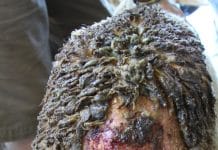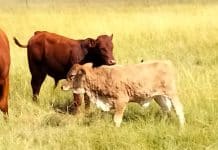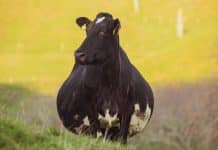Known for its high standards throughout the production chain, the Modderdrift table grape farming enterprise has set the benchmark for the table grape industry, giving it a competitive advantage when it comes to export markets. Better prices, greater savings and higher profits are just some of the benefits being reaped.
A family affair
Modderdrift is a family business with farms at De Doorns and Worcester and has been in the Beukes family’s possession for more than 100 years.
Brothers Jacques and Eugene are the fourth generation on the farm and are proud to be building on the solid foundation laid by their father, Pieter.
Today, Modderdrift produces, packs, and exports high-quality table grapes.
Total production has increased by more than 500% over the past 14 years – from 200 000 cartons of 4,5kg each to more than 1 million cartons, which are exported to countries around the world.
The grapes are cultivated on 200ha; 140ha is located in the Hex River Valley at De Doorns and 60ha at Brandwacht near Worcester. Preparations are being made to plant an additional 40ha at Brandwacht.
Although Jacques, who takes care of marketing, and Eugene, who oversees production, each run a clearly defined aspect of the business, they have sufficient knowledge to cover for one another, should the need arise. This is thanks to one of the most valuable lessons their father taught them, namely that you always climb a ladder from the bottom up.
“We had to start at the bottom and gain knowledge at each level of the business,” says Jacques. “We are now reaping the rewards as we are able to make informed decisions to the benefit of the business as a whole.”

The industry benchmark
Their father also taught them that the business must be in the green, i.e. without production debt, at least once every year.
“In an intensive and competitive industry such as ours, this requires innovative thinking. In fact, you can only achieve this if you are at the cutting edge in every aspect of the business. That is why we decided to set a benchmark for the industry in every branch of the business, including our vineyards, packhouses, traceability, food security and hygiene,” says Jacques.
“You must set yourself apart from the rest and ensure that you are a leader, not a follower. By choosing this direction, we have established ourselves as the leader. Today our product looks and tastes better and has a longer shelf life than that of our peers.”
Jacques explains the rationale behind them handling their own marketing. “You cannot aim to be at the forefront of every aspect of the business and then hand over your product to someone else for marketing. That is why we take care of our own marketing and here, too, we have set the standard.
“Our calculations show that we save approximately 7% in commission by doing our own marketing. We also achieve savings of between 2 and 5% in terms of logistics, which means a greater return on investment, as well as a 5 to 10% saving in purchases as we buy in bulk. These savings are pure profit.”
Driven by goals
Jacques says it is important for them to set clear goals for the business. Modderdrift’s ultimate goal is to be profitable and sustainable in the long term. “You must ensure that your cash flow is never under pressure. For that reason, it is vital that every level of the business is evaluated after every season.”
The production of and contribution that each cultivar and vineyard block make to the business, is fully evaluated every year. The return on investment of the different cultivars play an important role in their choice going forward, as well as in which production methods will be used.
All markets are also assessed seeing as price, market growth and consumer preferences are key in the planning of the following season’s marketing strategy.
In addition, managers and employees have clear goals which are aligned with those of the business. The contribution of every employee is evaluated to ensure they contribute to the ultimate goal. “Labour is one of our biggest expenses, which is why it is vital to have the right management systems in place. We also believe it is important to reward individuals based on their performance,” says Jacques.
Modderdrift’s markets
Altogether 97% of Moddersrift’s production is exported and Jacques explains that they do thorough planning every year to ensure they head into the harvest season with a solid marketing strategy. Their market includes supermarkets in the United Kingdom (UK), European Union (EU), United States (US) and Canada, as well as wholesalers in the East.
They take up a position ahead of each season from which they do not deviate. “We make provision for ad hoc trading, with approximately 10 to 15% of our high-value product to utilise better prices.
“By taking up a position, delivering a quality product and providing great service, we keep our competitors out of the market. To achieve this, we ensure that we know our markets and send the right cultivars to the right place. For example, in the Far East there is a considerable price difference between large and extra-large grapes. In the EU, however, taste and colour play a bigger role.”
The UK remains Modderdrift’s biggest market, comprising 70% of 2019’s exports and 60 to 65% of 2018’s exports. Prices are agreed upon ahead of time. As they are known for their quality and overall standards, Modderdrift has licenses with several companies for the packing and export of their cultivars.
One challenge of supplying a top-quality product, is that the demand is often greater than the supply, says Jacques. “To protect and expand our market share, we have entered into a partnership with two other producers who share our values. Part of their production, which meets our strict standards, is exported under the Modderdrift name.”
A respected trademark
As they handle exports themselves, a strong trademark is necessary – they use a tiger as symbol on their export cartons. “When we first started exporting, we had a strong focus on markets in the Far East. The tiger was chosen as our trademark as it is one of twelve animals of great importance in that region.”
The sunrise was the inspiration for the colour of the boxes going to the East, while cartons destined for the west are white, blue and red.

Safety and sustainability
According to Eugene, the principle of sustainability is the point of departure for all activities at Modderdrift. Efficient, environmentally friendly practices are applied, and the enterprise meets the requirements of good agricultural practices to deliver safe and healthy products to consumers.
Modderdrift’s three packhouses currently meet the requirements for the following certifications: GlobalGAP, Tesco Nurture (Gold score), BRC (AA score), Field to Fork, Walmart Security Audit (98% achieved), SIZA ethical audit (Gold score) and Grasp (100% achieved).
Food safety is a top priority, Eugene explains.
Every possible precaution is taken to keep residue levels to a minimum and to safely deliver their products to all markets. Modderdrift has an efficient traceability system that can trace each carton of grapes back to the vineyard where it was harvested, and even to which worker picked the grapes and when.
“During harvesting our grapes are handled as little as possible and are protected against temperature fluctuations. Combined with a strict cold chain, this ensures the best shelf life for our products.”
Out with the old
To meet consumers’ changing needs, 8 to 12% of older cultivars are replaced with new ones each year. While the market generally determines which cultivars are planted, they favour those that are less labour intensive and that deliver higher production. New cultivars are only sustainable if they can maintain production levels of more than 6 000 cartons per hectare.
Eugene says they pay a lot of attention to new plantings. In the second year after planting, a vineyard will already produce 50% of its production, reaching 100% by year three.
To speed up replacement, they buy two years’ worth of stock at a time and plant twice as many vines in the vineyard than final spacing requires. After the first year, every second vine is removed and planted in a new orchard. This practice allows them to gain up to two years.
Practicing precision
According to Eugene, precision farming techniques are practiced at every level. “Respect for the soil is the foundation of sustainable table grape farming. We must maintain the life in the soil and replace that which the plants withdraw every year.”
Technology is used to ensure that the plants and soil receive exactly what is needed for optimal health and productivity. By implementing new technology and better farming practices, they have been able to improve profitability through higher production (by up to 1 000 cartons per hectare) as well as ensure better quality.
Risky business
Table grape farming is intensive and largely dependent on the international market. Risks must be determined ahead of time and managed correctly, say the brothers.
The most common risks in the table grape farming industry include:
- The exchange rate: The value of the rand fluctuates considerably. “If you export by yourself, you must agree on prices ahead of time and secure a position in the market to hedge yourself. If the process is managed correctly, it can be very beneficial.”
- Market prices: Table grapes are a commodity with a ceiling price, making you dependent on demand and supply. “You must stay as close to the ceiling price as possible, but this is complicated by competitors who push prices down to expand their market share.”
- US influences: US president Donald Trump’s actions and trade wars resulted in a change in export patterns among countries. Products are now channelled to South Africa’s traditional markets, pushing prices down.
- Brexit: Brexit may have adverse effects on the industry if Britain’s agreement with the EU damages its economy.
- Blueberries: The blueberry market is riding on the coattails of table grapes instead of establishing a new market, thus stealing some of the market.
- The southeast wind: If the wind blows for a few days, fruit cannot be loaded onto ships for export. As producers cannot stop packing, products pile up causing an oversupply, which pushes prices down.
- Expropriation without compensation: Most successful farmers do not have another nest egg. They realise they must grow to remain sustainable, but they can only invest in a farming enterprise over which they have full control.
- Eskom: Table grape production requires reliable electricity supply throughout the production season.
- Crime: Measures to ensure the safety of farmers, their families, and their workers are becoming increasingly expensive. The number of farm murders is also concerning.
- High production costs: Farming inflation differs from normal inflation as most inputs (fuel, equipment, packaging and chemicals) are imported and are thus linked to international prices. Farming inflation is estimated at between 10 and 12%.
- Climate change: Abnormal rainfall patterns and weather cycles due to climate change put pressure on water resources. – Hugo Lochner, FarmBiz
For more information, contact Heleen Beukes on 071 360 3151 or visit www.modderdrift.co.za.







